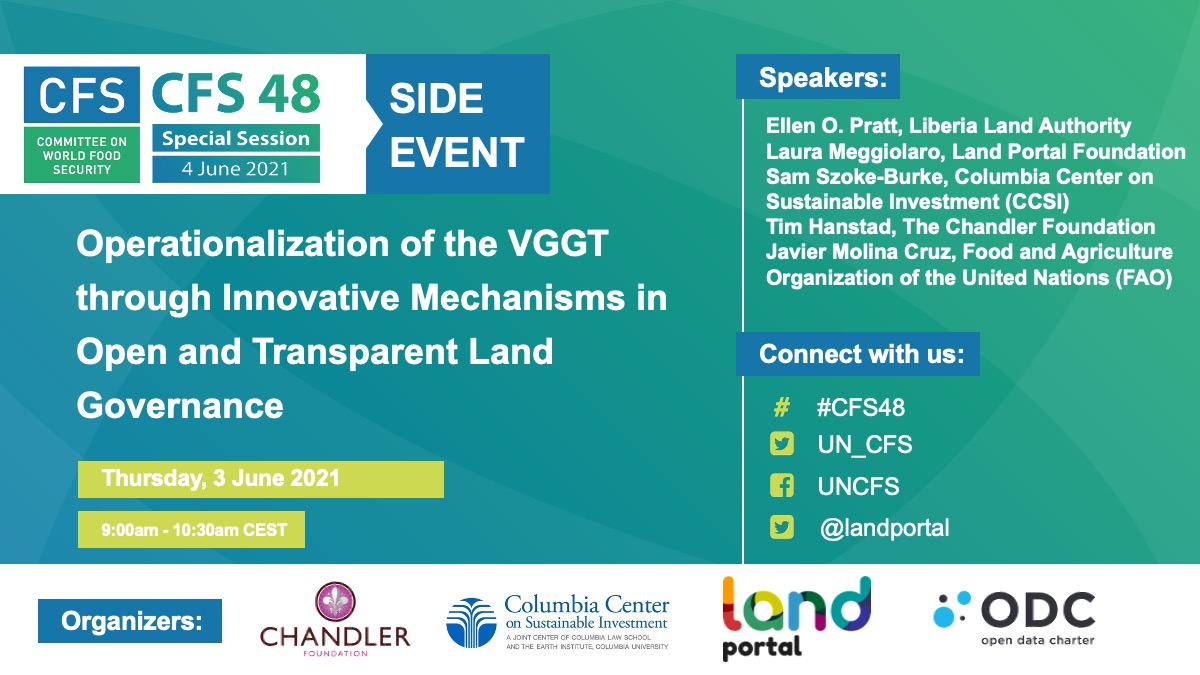This event explored the benefits of open and transparent land governance systems for the operationalization of the Voluntary Guidelines of the Governance of Tenure.
Javier Molina Cruz, Senior Land Tenure Officer at the Food and Agriculture Organization of the United Nations (FAO) was the chair of the event. During his introduction, he noted that according to article 7 of the VGGT, governments should identify all existing tenure rights and right holders, whether recorded or not, including for indigenous peoples and other communities with customary tenure systems.
Sam Szoke-Burke, a Legal Researcher for the Columbia Center on Sustainable Investment (CCSI), highlighted the importance of designing systems that meet the needs of diverse constituencies to assure less-dominant actors, such as communities, indigenous peoples, and women, are not left behind. He emphasized four critical components of transparency, including disclosure of all relevant and accurate information in a timely manner, safe access to information, providing information in comprehensible formats and ensuring governance systems are open and democratically responsive.
Tim Hanstad, CEO of the Chandler Foundation, underlined that strong land rights upheld by land institutions provide housing security, give confidence for individuals to invest in land and businesses, allow companies and households to borrow using land as collateral, enable governments to collect property taxes, and are a foundation for sustainable environmental stewardship. He underscored that working land tenure systems and institutions serve as the foundation for sustainable prosperity. Mr. Hanstad noted that corruption is a cancer that substantially limits the ability of government institutions – including land institutions -- to provide the good governance necessary to build an inclusive prosperity.
Natalia Carfi, Interim Executive Director of the Open Data Charter, presented their Open Up Guide methodology, which is a tool aimed to be used by governments to collect, manage, and release sectoral data to improve data quality, availability, accessibility and use to promote citizen engagement, decision making and innovation, focusing on a range of sectors and addressing agriculture, climate change, corruption and land governance.
Laura Meggiolaro, Team Leader of the Land Portal Foundation, then presented the Open Up Guide on Land Governance, which is directed at governments as a playbook to support them in making their land governance data open and available for others to reuse. She underscored how the Open Up Guide on Land Governance sets out clear key datasets for land management accountability, and how they should be collected, stored, shared, and published for improving land governance and transparency.
Ellen O. Pratt, Commissioner of the Liberia Land Authority, emphasized that her institution plays a pivotal role in land governance in Liberia, as they are tasked with effective and equitable land governance. She indicated that with the help of our multi stakeholder platform for the VGGT, Liberia passed a landmark legislation in support of land rights, named the Land Rights Act in 2018, arguing that this is one of the most progressive laws in support of customary land tenure on the African continent. She said that lack of information is a key challenge, particularly because 43% of the Liberian population is illiterate, indicating that key provisions of law, particularly sections relating to customer land tenure, were translated into local languages, as well as broken down into ‘Liberian English.’ Ms. Pratt extended her gratitude for the initiative to develop the Open Up Guide on Land Governance, and said that the Liberia Land Authority is prepared to pilot this guide in Liberia.
Chris Hegadorn, CFS Secretary, took the floor, and expressed appreciation for Ms. Pratt’s presentation, and indicated that there is a great need to hear about these shared experiences to help inform other countries who are struggling with many of these same issues, such as questions of governance and fighting corruption, which undermines so much of the good work that is being done.
Chair

Javier Molina CruzFood and Agriculture Organization
of the United Nations
(FAO)
Panelists

Laura
Meggiolaro
Team Leader
Land Portal
Foundation

Natalia
Carfi
Deputy Director
Open Data
Charter

Ellen O.
Pratt
Commissioner
Liberia Land
Authority

Tim
Hanstad
CEO
The Chandler
Foundation

Sam
Szoke-Burke
Legal Researcher
Columbia Center on
Sustainable Investment
(CCSI)
Organizers:
- Land Portal Foundation
- Food and Agriculture Organization of the United Nations (FAO)
- Columbia Center on Sustainable Investment (CCSI)
- Open Data Charter
- Liberia Land Authority
- The Chandler Foundation
Objectives:
- Participants will gain practical lessons in how governments can adopt open and transparent systems in land governance for the benefit of land stakeholders, which increases food security and nutrition.
- Participants will hear from leading women voices on how better governance of land acquisitions can enable government operationalization of the VGGT for the benefit of stakeholders, including indigenous peoples.
- Participants will hear about new and innovative initiatives from leading authorities that are contributing to improved land governance.

